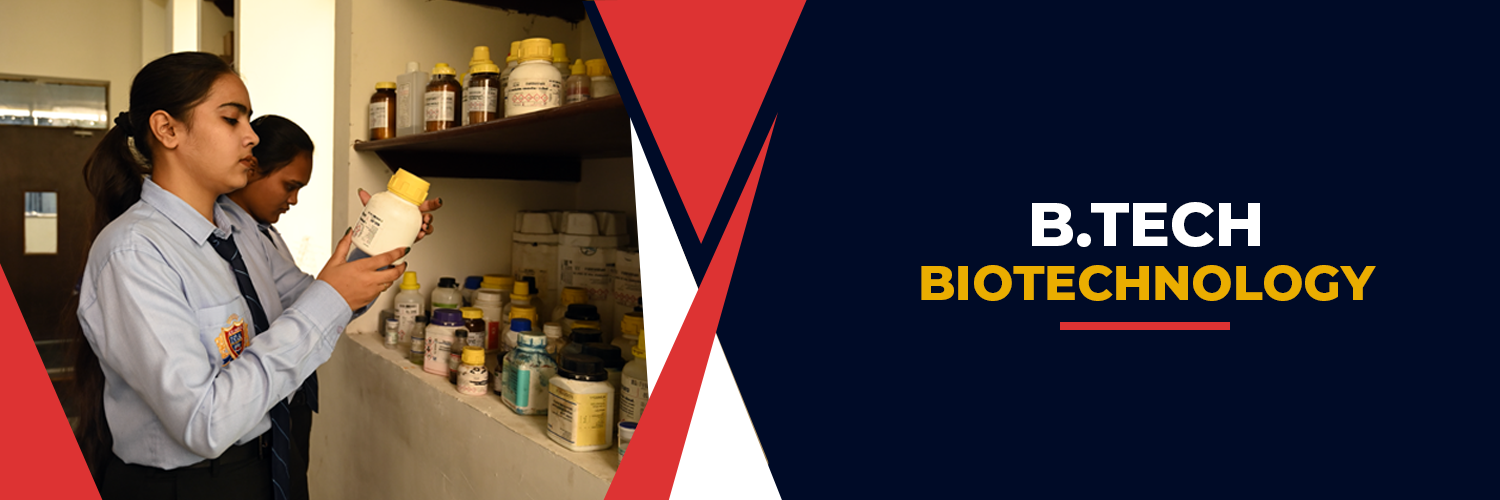![]()
Ambalika Institute of Management and Technology offers an undergraduate program in Biotechnology, specifically, B.Tech Biotechnology. It is the best Biotechnology course in Lucknow affiliated to AKTU and follows the eight-semester structure prescribed by it.
B.Tech in Biotechnology consists of subjects from both life sciences and engineering streams. The goal of biotechnology is to examine biology from a technological standpoint. It is the study of biological processes and how to apply them to industry, such as researching microbes and using that information to create medicines, antibiotics, and other treatments.
Because of the numerous opportunities that advancements in technology bring, the field of biotechnology is always changing. Clinical technician, medical scientist, biochemist, biomedical engineer, and bio-manufacturing specialist are among the possible professional paths. Together with academic knowledge, the course offers practical experience that equips students for a successful career in the dynamic and quickly developing sector of biotechnology.
What sets our Biotechnology department apart from others?
At the heart of innovation and discovery, our biotech department is dedicated to advancing the boundaries of biological sciences and applying them to real-world challenges. We are a dynamic team of researchers, educators, and professionals committed to harnessing the power of biotechnology to improve human health, agriculture, and the environment.
- Research Excellence: Our department is at the forefront of biotechnology research, exploring diverse areas such as genetic engineering, molecular biology, bioinformatics, and synthetic biology. Our cutting-edge laboratories and facilities support pioneering studies that contribute to scientific knowledge and technological advancements.
- Educational Programs: We offer a range of programs designed to equip students with the skills and knowledge needed for success in the biotechnology field. Our curriculum blends theoretical learning with hands-on experience, preparing graduates to excel in research, industry, and beyond.
- Industry & Research Institute Collaboration: We actively engage with industry partners to bridge the gap between academia and real-world applications. Through collaborative projects, internships, and consultancy, we ensure that our research and education remain relevant and impactful.
- Community Engagement: We are committed to fostering a vibrant scientific community and promoting public understanding of biotechnology. Our outreach programs, seminars, and workshops aim to inspire curiosity and encourage dialogue about the potential and challenges of biotechnological advancements.
- Our Team: Our faculty and staff are passionate about their work and bring a wealth of expertise to the department. From internationally recognized researchers to dedicated educators, our team is united by a shared commitment to excellence and innovation. Whether you are a prospective student, a researcher, or an industry partner for collaboration, we invite you to explore the opportunities within our department and meet our faculty to examine their research interests. Discover how you can be part of our vibrant community and contribute to the exciting world of biotechnology!
Program Educational Outcomes
PEO 1: To prepare biotechnology graduates for a successful technical and professional career as per the needs of the biotechnology industry.
PEO 2: To provide students with a strong foundation in scientific, engineering and mathematical fundamentals necessary to design, analyze and solve technical problems in the biotechnology industry.
PEO 3: To inculcate professional and ethical attributes in the students and to promote lifelong learning of attributes related to biotechnology.
PEO 4: To encourage students to pursue higher education and research.
PEO 5: To develop graduates with enhanced technical acumen, aptitude, communication and professional skills.
Program Outcomes
PO 1: Engineering knowledge: Apply the knowledge of mathematics, science, engineering fundamentals, and an engineering specialization to the solution of complex engineering problems.
PO 2: Problem analysis: Identify, formulate, review research literature, and analyze complex engineering problems reaching substantiated conclusions using first principles of mathematics, natural sciences, and engineering sciences.
PO 3: Design/development of solutions: Design solutions for complex engineering problems and design system components or processes that meet the specified needs with appropriate consideration for the public health and safety, and the cultural, societal, and environmental considerations.
PO 4: Conduct investigations of complex problems: Use research-based knowledge and research methods including design of experiments, analysis and interpretation of data, and synthesis of the information to provide valid conclusions.
PO 5: Modern tool usage: Create, select and apply appropriate techniques, resources, and modern engineering and IT tools including prediction and modeling to complex engineering activities with an understanding of the limitations.
PO 6: The engineer and society:Apply reasoning informed by the contextual knowledge to assess societal, health, safety, legal and cultural issues and the consequent responsibilities relevant to the professional engineering practice .
PO 7: Environment and sustainability: Understand the impact of the professional engineering solutions in societal and environmental contexts, and demonstrate the knowledge of, and need for sustainable development.
PO 8: Ethics: Apply ethical principles and commit to professional ethics and responsibilities and norms of the engineering practice.
PO 9: Individual and team work: Function effectively as an individual, and as a member or leader in diverse teams, and in multidisciplinary settings.
PO 10: Communication: Communicate effectively on complex engineering activities with the engineering community and with society at large, such as, being able to comprehend and write effective reports and design documentation, make effective presentations, and give and receive clear instructions.
PO 11: Project management and finance: Demonstrate knowledge and understanding of the engineering and management principles and apply these to one’s own work, as a member and leader in a team, to manage projects and in multidisciplinary environments.
PO 12: Lifelong learning: Recognize the need for, and have the preparation and ability to engage in independent and life-long learning in the broadest context of technological change.
Program Specific Outcomes
PSO 1: Graduate shall have the ability to apply fundamental knowledge of mathematics, biology, biological processes, and the scientific method to solve problems in biotechnology.
PSO 2: Graduate shall have the ability to integrate biological knowledge and concepts with the ethical and industrial perspectives of biotechnology and life sciences.
PSO 3: Graduate shall have the ability to work in groups or individually to develop written and oral presentations skills for effective communication of scientific concepts. Students are expected to engage in independent and lifelong learning in the context of biotechnological advancements.
PSO 4: Graduate shall have the ability to apply major quantitative and computational skills and tools to solve problems in the biotechnology industry.


